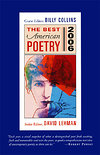
J. Allyn Rosser
Auteur de The Best American Poetry 2006
A propos de l'auteur
J. Allyn Rosser is the author of three previous poetry collections: Foiled Again, Misery Prefigured, and Bright Moves. She is the recipient of numerous awards, most recently the New Criterion Poetry Prize and fellowships from the Guggenheim and Lannan Foundations. Rosser is associate professor of afficher plus English at Ohio University and is editor in chief of New Ohio Review. afficher moins
Œuvres de J. Allyn Rosser
Oeuvres associées
Étiqueté
Partage des connaissances
- Nom légal
- Rosser, Jill Allyn
- Date de naissance
- 1957
- Sexe
- female
- Nationalité
- USA
- Lieu de naissance
- Bethlehem, Pennsylvania, USA
- Lieux de résidence
- Athens, Ohio, USA
- Études
- Middlebury College
University of Pennsylvania - Professions
- poet
- Relations
- Halliday, Mark (husband)
- Prix et distinctions
- Peter I. B. Lavan Younger Poets Award (1991)
Membres
Critiques
Prix et récompenses
Vous aimerez peut-être aussi
Auteurs associés
Statistiques
- Œuvres
- 5
- Aussi par
- 6
- Membres
- 216
- Popularité
- #103,224
- Évaluation
- 3.8
- Critiques
- 6
- ISBN
- 9
- Favoris
- 1


as long as it's piked on thick enough
not to question our cultivated jadedness
while sipping at the martini of its hyperbole.